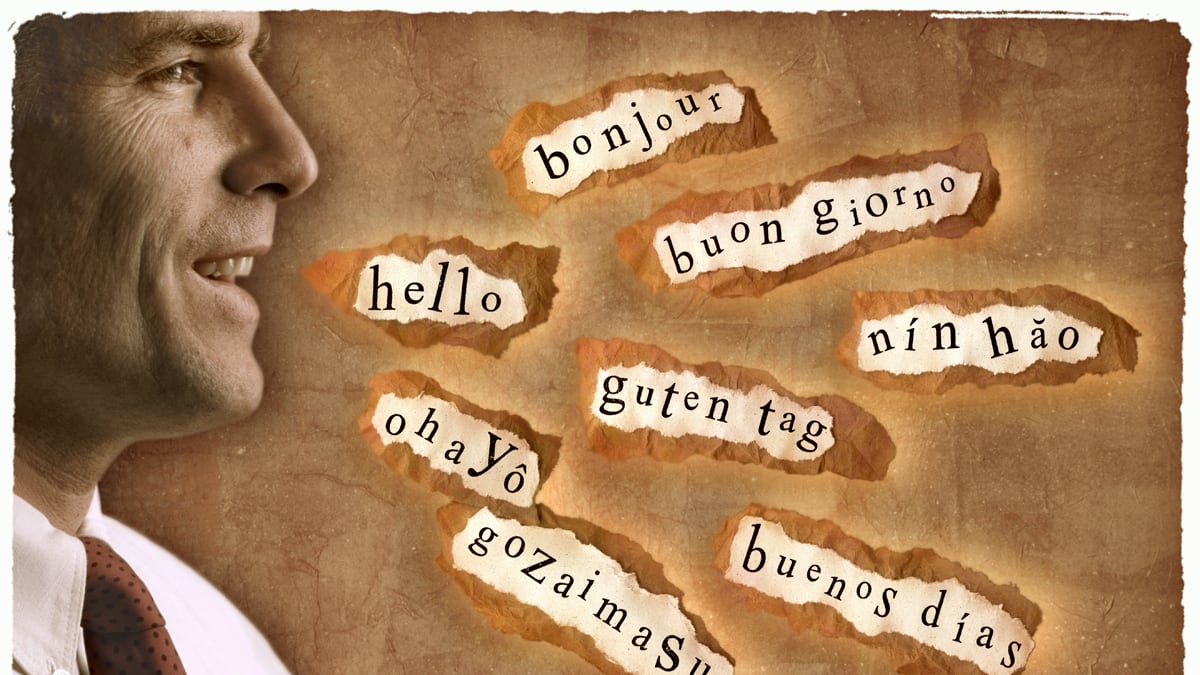On a quest to find the person we could say spoke the most languages in the world, I stumbled on the online personae of a language learning guru and hyperpolyglot, Alexander Arguelles, who invited me to Berkeley, California, where he was living at the time. It was my first introduction to the life of the contemporary hyperpolyglot. On many mornings, once Alexander has greeted the sun doing extensive writing exercises in Chinese, Arabic, Latin, Russian, Persian, German, and other languages, he goes for a long run in the arid hills of the park above his neighborhood, while listening to a German audiobook tape on his Walkman. (So far, he eschews the MP3.) Marathon lengths are easy for him—once, he says, he got lost in the woods and ended up running more than thirty miles, though he felt faint. Later someone told him that long-distance runners have to eat every two hours, which came as a revelation; he finds the carbohydrate goo disgusting. He eschews that, too.
One morning, he discovered the campus of a theological seminary that he now covets for a polyglot academy he dreams of starting. The school was made up of low, Mission Revival–style buildings surrounded by redwoods and eucalyptus trees stirred by the wind. Alexander pointed to a fire trail cutting down the hill, saying that it would be good for shadowing. Shadowing is how he gets to know a language’s sounds: put a tape in the Walkman and, while briskly walking and arms swinging, you shout the sounds as you hear them. Though you won’t know what the words mean, later you read the dialogues and translate them, then you shadow the same material again. For him, parsing the sounds first then adding meaning later makes it stick. Shouting now is also an inoculation against embarrassment later.
At first, I assumed that his ambition was to speak all of his languages—otherwise, what’s the point of shadowing? This turned out to be wrong. I also assumed that he might like to talk to people. That, too, wasn’t right. His goal is to read literature from all over the world, classic and contemporary, in the original languages. He had shown me a recent novel by a Dutch author. “Reading this puts me in tune with the living spirit, the resonance of the language,” he’d said, waving the book, “not being able to go to Amsterdam and go into a café and get a hash brownie and have them think that I’m one of them, not an American tourist.” He wants to explore his consciousness, to encounter a language as a living entity, and to collect the esoteric knowledge of these encounters. “Most of the languages I’ve studied I’ve never spoken, and I probably never will,” he told me. “And that’s okay with me. That’s nice if you can do that, but it’s rare that you have an interesting conversation in English. Why do I think it would be any better in another language?”

As we walked around the seminary grounds, he pointed out a cloister, also a good space for shadowing. He cut the air with his finger, imagining himself the school principal: here he’d put Korean, here Chinese, over there Japanese, letting students drift from area to area. He’d do this, he said, because he encounters languages not as finite, divisible things, but as fuzzy clouds. Labeling something “French” or “Italian” is a convenience, not a reflection of the reality he perceives. His students should have that experience, too. What the rest of us call a “language” is, to Alexander, a minor variation on a broader linguistic theme. “For me to learn any Romance or Germanic dialect, just put me in the environment, and it would come alive,” he said. “It would be building upon thousands and thousands of hours of active conscious study of other languages.” Even if he were to set out today to learn a language unrelated to one he already knows, he said, “I would have to put in fewer hours than compared to, say, you.”
A sunlit courtyard with a dry, cracked fountain at its center beckoned us to stop. “The way I see it,” he said, “there are three types of polyglots. There are the ultimate geniuses, the ones who are so rare, the ones who excel at anything they do, and one of those happens to be languages.

“There are people who are only good at languages for whom it comes very easily." One of these was Cardinal Giuseppe Mezzofanti, a 19th century Italian cardinal who used many languages (some say 72); I had excavated his archives in Bologna and discovered other facts about him. "Then there are people like me: we’re willing to work very, very hard, and everything we know, it’s because we’ve worked to get it. I would think those would be the people you’d be most interested in: what sort of strategies do they have that they can teach everybody else?”
Walking next to Alexander, I began to feel stupid, soft, and modern. I asked him what he thought of people who have only one language. I feel sorry for them, he replied. He maintains that every educated person should know six of them. Informality makes him uncomfortable. He gets a lot of emails that don’t have formal salutations, which bugs him. The forum posts he doesn’t like because they’re not “scholarly.” He admires figures of the Enlightenment who invented things, wrote poetry, made scientific discoveries, and learned lots of languages. That contemporary society lacks comparable polymaths he takes as a sign of civilization’s decay. Understandably, he has a hard time fitting in to modern institutions. As a graduate student, a professor told him that an ambition to learn more languages would mark him as a dilettante, not a scholar. Decades later, that comment still stings Alexander so badly that he longs to prove that professor wrong.
As we got back in the car, I asked if he reads newspapers to practice his languages—I had imagined the hyperpolyglot to be someone conversant in the current events of a dozen cities.
“You know what the Greek word for ‘newspaper’ is? Ephimerida,” he replied. His prickliness surprised me.
“So, no,” I said. “No.” He eschews them, too.
Alexander sees himself as a rebel. Over there is the world, which drives people to specialize in ever-narrowing areas of knowledge. Over here is Alexander, who wants to embrace all literatures, all peoples. Yet he’s an exemplar of the very trend he decries. Though he knows many languages, studying them is nearly all he does. For proof, look at how closely he’s documented every minute of every deliberate encounter with a foreign language.
He pulled out a laptop on the neatened kitchen table and showed me how it works. Years ago, when he first started on his polyglot path, he wrote on paper in runes or Chinese characters; now he uses Excel spreadsheets and Arabic numerals. In one column go the scriptorium pages he’s completed; figuring fifteen minutes a page, he calculates a total number of hours per language and language family, broken down by minutes per day—ask him how much German writing he’s done, and he can tell you in the blink of an eye (fifty-seven hours). He also accounts for reading narratives, listening to recorded books while running, doing grammar drills, reviewing, and shadowing. I noticed that he never talks about parts of language or the things that delight him, and when I asked him if he has favorite vowels or verb structures or consonants, he seemed to be baffled. He talks purely in units of time, of labor. He’s like someone who loves food but mostly discusses it in terms of its calories rather than its flavors.
How much time are we talking about here? Over the last 456 days, according to Alexander’s spreadsheet, he’s spent 4,454 hours (about 40 percent of the 10,944 hours of those 456 days) on languages, arranged in descending order by the total number of hours of study:
English—456 hours Arabic—456 hours French—357 hours German—354 hours Latin—288 hours Chinese—243 hours Spanish—217 hours Russian—213 hours Korean—202 hours Sanskrit—159.5 hours Persian—153 hours
Greek—107 hours Hindi—107 hours Gaelic—107 hours Polish—102 hours Icelandic—83 hours Czech—57.50 hours Serbo-Croatian—57.50 hours Swedish—51 hours Catalan—44 hours
Old Norse—40 hours Italian—39.50 hours
Portuguese—37.50 hours Turkish—34.75 hours Japanese—30 hours Romanian—26.25 hours Ancient Greek—22 hours Middle High-German—17 hours Danish—17 hours Anglo-Saxon—14 hours
Old French—14 hours Afrikaans—12 hours Norwegian—12 hours Occitan Provençal—12 hours Swahili—12 hours Ukrainian—10 hours
New Norse—8 hours Vietnamese—4 hours
He’s spent between half an hour to three hours studying another sixty-seven languages. “I’ll probably never know Kazakh,” he said, “but I want to know what Kazakh sounds like. If I hear people speaking Kazakh on the street, I want to know, ‘That’s Kazakh.”






